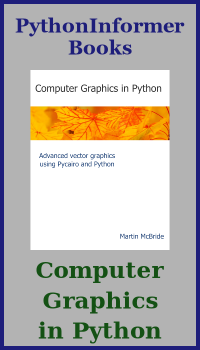List monad
Categories: functional programming

In the article on the Failure monad we looked at a simple definition of what a monad is:
A monad is a design pattern that allows us to add a context to data values, and also allows us to easily compose existing functions so that they execute in a context aware manner.
In this article we will look at the List monad. This is a monad that allows us to process lists of values, without cluttering our code with looping constructs.
How a List monad is used
As with the Failure monad, our List monad should do three main things:
- Allow us to wrap a value (in this case, a list value) in a List monad.
- Allow us to apply ant existing function to the entire list, using bind().
- Allow us to retrieve the List from a monad.
So a simple use might be like this:
k = List([1, 2, 3])
n = k.bind(neg)
print(n) # List([-1, -2, -3])
We will call our monad List because that is the name that is commonly used for similar monads in other languages. Notice that a List monad is quite different to a normal Python list.
List monad implementation
Based on the previous implementation of the Failure monad, here is our List monad:
class List():
def __init__(self, value):
self.value = value
def get(self):
return self.value
def bind(self, f):
result = list(map(f, self.value))
return List(result)
def __str__(self):
return 'List(' + ', '.join(map(str, self.value)) + ')'
def __or__(self, f):
return self.bind(f)
The List monad just wraps a single value, which should be a list or other sequence. This is stored as self.value.
The bind function uses map to apply the supplied function f to each element in self.value. The resulting list is wrapped in a new List monad.
We overload str to return 'List([contents of list])'. Finally we overload the or operator | so we can use it as a bind operator.
Related articles
- Introduction to Functional Programming
- Functions
- Pure functions
- Lambda functions
- Iterators
- Iterators vs iterables
- Built-in functions on iterables
- Transforming iterables
- Map/reduce example
- Generators
- Functional design patterns
- Recursion and the lru_cache in Python
- Partial application
- Closures
- Monads
- Failure monad
- Maybe monad
Join the GraphicMaths/PythonInformer Newsletter
Sign up using this form to receive an email when new content is added to the graphpicmaths or pythoninformer websites:

Popular tags
2d arrays abstract data type and angle animation arc array arrays bar chart bar style behavioural pattern bezier curve built-in function callable object chain circle classes close closure cmyk colour combinations comparison operator context context manager conversion count creational pattern data science data types decorator design pattern device space dictionary drawing duck typing efficiency ellipse else encryption enumerate fill filter for loop formula function function composition function plot functools game development generativepy tutorial generator geometry gif global variable greyscale higher order function hsl html image image processing imagesurface immutable object in operator index inner function input installing integer iter iterable iterator itertools join l system lambda function latex len lerp line line plot line style linear gradient linspace list list comprehension logical operator lru_cache magic method mandelbrot mandelbrot set map marker style matplotlib monad mutability named parameter numeric python numpy object open operator optimisation optional parameter or pandas path pattern permutations pie chart pil pillow polygon pong positional parameter print product programming paradigms programming techniques pure function python standard library range recipes rectangle recursion regular polygon repeat rgb rotation roundrect scaling scatter plot scipy sector segment sequence setup shape singleton slicing sound spirograph sprite square str stream string stroke structural pattern symmetric encryption template tex text tinkerbell fractal transform translation transparency triangle truthy value tuple turtle unpacking user space vectorisation webserver website while loop zip zip_longest
